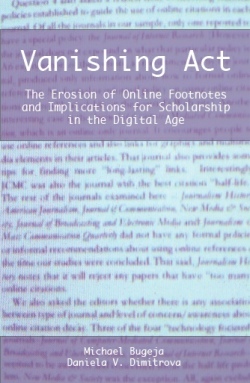New Book: Vanishing Act: The Erosion of Online Footnotes and Implications for Scholarship in the Digital Age
Vanishing Act: The Erosion of Online Footnotes and Implications for Scholarship in the Digital Age
Authors: Michael Bugeja and Daniela Dimitrova
Price: $18.00
Published: Summer 2010
ISBN: 978-1-936117-14-7
Printed on acid-free paper
A decade ago, most research was done in the library rather than through its Web site, and scholars, editors, graduate directors and librarians were meticulous about the integrity of footnotes. They knew that citation was the backbone of research, from agronomy to zoology in the sciences and from art history to Zen studies in the humanities. The footnote upheld standards because it allowed others to test hypotheses or replicate experiments. In sum, the footnote safeguarded scientific method and peer review upon which academe is based, from papers by first-year and transfer students to books by postdoc and professor.
Since 2003, authors Michael Bugeja and Daniela Dimitrova (Iowa State University of Science and Technology) have been at the forefront of research on the erosion of online footnotes and its implication for scholarship. Their research has been showcased in The Chronicle of Higher Education and a number of academic journals, including The Serials Librarian, portal: Libraries and the Academy, New Media and Society and Journalism and Mass Communication Educator, among others. Their book documents the vanishing act in flagship communication journals and provides readers with methods to mitigate the effect.
Michael Bugeja is director of the Greenlee School of Journalism and Communication at Iowa State University where he also serves on the board of the Institute of Science and Society. He is the author of 20 books, including the acclaimed Interpersonal Divide: The Search for Community in a Technological Age (Oxford Univ. Press, 2005) and Living Ethics across media platforms, and writes for several magazines, including The Chronicle of Higher Education and Inside Higher Ed. His comments about ethics appear in Columbia Journalism Review, American Journalism Review, Quill, Editor & Publisher and other publications.
Dr. Dimitrova’s research focuses on Information and Communication Technologies, Internet Diffusion, and Political Communication (ICTs). Her dissertation examined Internet adoption in the post-communist countries and proposed a multidimensional framework to predict Internet diffusion globally. Another interest is online news coverage of conflict (wars and terrorist attacks).

5 comments on “New Book: Vanishing Act: The Erosion of Online Footnotes and Implications for Scholarship in the Digital Age”
That is unfortunate. With the availability of so much source information on the web, even academic journal articles (although these are often restricted to a limited group of users), I would think in many cases it would be possible to link to the source in online footnotes.
Hi, Stephen
The book is not about hyperlinking from footnotes to sources, but it is about something that would affect that practice if it were instituted. It is about the tendency of citations to online sources to become out of date and stop being valid as URLs change and things are taken off of the web. From the point of view of scholarship, this is a bad thing not primarily because it becomes inconvenient to get from point A to point B but because it erodes the foundation of the research that is being reported, if citations become unfindable. It relates to the structure of scholarly work in general and how it has been affected by the move to the internet.
Thanks for the clarification Rory. That is an issue when I catalog books, as we often have links for either the table of contents or full contents included in the record. But if the footnote is to a source that is also available in print, the citation would still be findable, even if the url was out of date, true?
Yeah. I think the problem is sources that are not in print.
Comments are closed.